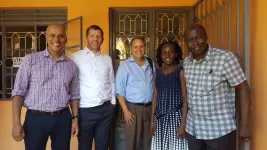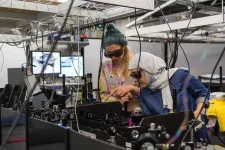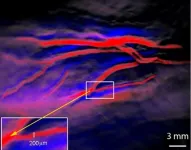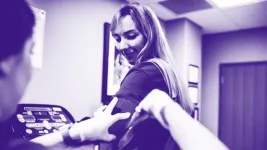(Press-News.org) Michiganders will continue to have the opportunity to advance medical research aimed at advancing individualized health care through a renewed award to Henry Ford Health + Michigan State University Health Sciences from the National Institutes of Health’s (NIH) All of Us Research Program. The award includes $18.3 million in initial funding to support a consortium of 8 health care provider organizations with a presence in 16 states.
Henry Ford has led the consortium since 2017. The renewed award allows participation to continue until at least 2028. The multimillion-dollar multi-year award represents the largest NIH research grant in Henry Ford’s 108-year history.
All of Us aims to change the one-size-fits-all approach to medicine by engaging at least one million people who reflect the diversity of the United States. Participants contribute a range of health information to help researchers accelerate findings for treatments, prevention, and diagnosis that can be more tailored to individuals. Participants who join All of Us can choose to receive personal health-related genetic information at no cost, that could help guide their health care journeys.
“We are proud to be leaders in this effort that is revolutionizing health care research,” said Steven Kalkanis, M.D., Executive Vice President and Chief Academic Officer at Henry Ford Health. “This tremendous award from NIH is a testament to our team’s passion and commitment to identifying ways to prevent and understand disease, develop new treatments, and address health care disparities for the people we serve here in Michigan and beyond.”
All of Us participants can choose to receive health-related DNA results that provide insight into their genetic ancestry, traits, a possible risk for developing serious health conditions, and how their body might react to certain medicines. Participants have access to genetic counselors at no cost and can choose to share their health information with their providers.
“I’m looking forward to working with my doctors to use my health-related DNA research results,” said Randee Bloom, a 68-year-old All of Us Research Program participant from West Bloomfield, Michigan.
Participants like Bloom contribute their DNA for use in a secure cloud based All of Us data platform, which can be accessed by registered researchers. The data participants share with the program, and ultimately researchers, does not contain a participant’s name or other information that could directly identify them.
“I feel that by contributing my data to the program, I’m doing my part to help advance medical research,” Bloom said.
Unlike research studies that focus on one disease or group of people, the All of Us dataset is being used by more than 8,000 researchers, including 125 in Michigan, to inform thousands of studies on a variety of health conditions.
“Using the All of Us database, researchers are discovering new methods and medicines that will benefit people from diverse backgrounds, geographies, and ancestries,” said Christine Johnson, Ph.D, MPH, chair of Henry Ford’s Department of Public Health Sciences and one of the lead scientists on the All of Us Research Program at Henry Ford Health.
Henry Ford leads a consortium of health care provider organizations that represent diverse communities across the United States, including Baylor Scott & White Health; Essentia Health; HealthPartners; University of Massachusetts and Reliant Medical Group; Corewell Health; St. Louis University and SSM Heath; and Kaiser Permanente Northwest. The consortium has enrolled one of the program’s largest and most diverse groups of participants in the nation.
“By recruiting a diverse group of participants in the program, our consortium is ensuring medical scientists can detect more uncommon or unusual variations that affect health and disease, which will be helpful for all people,” said Brian K. Ahmedani, Ph.D, director of the Center for Health Policy & Health Services Research at Henry Ford Health and a lead scientist on the program.
Researchers at Henry Ford have utilized the All of Us dataset in multiple studies, including research around the prevalence of multiple sclerosis and what demographics it affects; the prevalence of opioid use and its association with sociodemographic characteristics; and which genes are connected to hidradenitis suppurativa, a chronic and painful skin condition. The team at Henry Ford Health has also utilized the data to better understand participants’ willingness to share health information with the program itself.
“We are excited to be able to continue to offer our communities an easy way to become part of a cutting-edge research program,” said Cathryn Peltz, Ph.D, one of Henry Ford’s lead scientists on the program. "It's the chance to make a difference in not only their own health but that of future generations.”
To learn more about Henry Ford Health’s role in the program, or to participate, visit: henryford.com/joinallofus.
The All of Us Research Program at Henry Ford Health is funded by the National Institutes of Health award OT2OD036429.
###
All of Us, the All of Us logo, and “The Future of Health Begins with You” are service marks of the U.S. Department of Health and Human Services.
END
Chicago, IL – January 24, 2024 – The first study to map the prevalence of bilateral hearing loss in the United States by state and county finds that rates of hearing loss are higher among men, non-Hispanic Whites, and residents of rural areas. Bilateral hearing loss is hearing loss in both ears.
West Virginia, Alaska, Wyoming, Oklahoma, and Arizona had the highest rates of hearing loss, while the District of Columbia, New Jersey, New York, Maryland, and Connecticut had the lowest (see top ten highest and ...
The Chicago-based Great Lakes ReNEW coalition has been awarded one of the largest, if not the largest, climate awards in the city’s history – up to $160 million over 10 years as one of the inaugural U.S. National Science Foundation’s Regional Innovation Engines.
Authorized in the “CHIPS and Science Act of 2022,” the NSF Engines program is designed to support the development of diverse regional coalitions of universities, local governments, the private sector and nonprofits to create solutions to today’s pressing issues.
Selected from an initial pool of more ...
INDIANAPOLIS -- Clinical research led by Indiana University School of Medicine investigators and their collaborators in Uganda has revealed that hydroxyurea significantly reduces infections in children with sickle cell anemia. Their latest findings enhance strong evidence of hydroxyurea’s effectiveness and could ultimately reduce death in children in Africa, the continent most burdened by the disease.
The group’s research, recently published in the journal Blood, revealed that hydroxyurea treatment resulted in a remarkable ...
The University of Manchester and SPIE, the international society for optics and photonics have announced the establishment of the SPIE-Manchester Postgraduate Scholarship in Photonics.
The $500k gift from the SPIE Endowment Matching Program will be matched 100% by the University and will be used to support both early-career and returning researchers from the University’s Photon Science Institute in partnership with the Royce Institute, the UK’s national institute for advanced materials research and innovation.
The partnership was announced today (29 January) during the SPIE Photonics West conference in San Francisco.
Photonics is the study of light and its interactions ...
New material is self-assembling, long-lasting and recyclable.
As electronic devices get smaller, the materials needed to create them get smaller as well. Nanoscience is the study of extremely small materials that find uses in energy storage, electronics, health and safety applications and more.
Now a team led by the U.S. Department of Energy’s (DOE) Lawrence Berkeley National Laboratory has developed a new self-assembly method to fabricate multilayered 2D nanosheets. A nanosheet is an extremely small, lasagna-like material made of ultrathin layers of polymers and nanoparticles.
These nanosheets have significantly ...
Researchers at OU Health Stephenson Cancer Center at the University of Oklahoma Health Sciences have embarked on a revolutionary new research study that could improve the detection of a deadly disease — pancreatic cancer — and give patients a chance to live longer, healthier lives.
The research focuses on an innovative combination of imaging techniques: a newly created contrast agent that recognizes pancreatic cancer cells, paired with Multispectral Optoacoustic Tomography, or MSOT. Together, the approach can detect pancreatic cancer cells the width of an eyelash ...
As sea levels rise due to global warming, ecosystems are being altered. One small silver lining, scientists believed, was that the tidal wetlands found in estuaries might produce less methane – a potent greenhouse gas – as the increasing influx of seawater makes these habitats less hospitable to methane-producing microbes.
However, research from biologists at Lawrence Berkeley National Laboratory (Berkeley Lab) and UC Berkeley indicates that these assumptions aren’t always true. After examining the microbial, chemical, and geological features of 11 wetland zones, the team found that a wetland region exposed ...
A new qualitative study highlights the negative interpersonal and psychological consequences associated with “yo-yo dieting,” also known as weight cycling. The work underscores how toxic yo-yo dieting can be and how difficult it can be for people to break the cycle.
“Yo-yo dieting – unintentionally gaining weight and dieting to lose weight only to gain it back and restart the cycle – is a prevalent part of American culture, with fad diets and lose-weight-quick plans or drugs normalized as people pursue beauty ...
Star-shredding black holes are everywhere in the sky if you just know how to look for them. That’s one message from a new study by MIT scientists, appearing today in the Astrophysical Journal.
The study’s authors are reporting the discovery of 18 new tidal disruption events (TDEs) — extreme instances when a nearby star is tidally drawn into a black hole and ripped to shreds. As the black hole feasts, it gives off an enormous burst of energy across the electromagnetic spectrum.
Astronomers have detected previous tidal disruption events by looking for characteristic bursts in the optical and X-ray bands. To date, these searches have ...
January is a time when many people are looking for new diet routines, and intermittent fasting is trending, as are traditional calorie cutting programs.
Research conducted with animal models suggests that intermittent fasting slows aging, and those animals live longer. Researchers at the Pennington Biomedical Research Center and the University of Alabama at Birmingham are conducting the DiAL-Health study to see if eating for 8 hours and fasting for 16 each day shows similar results in people. These researchers ...







